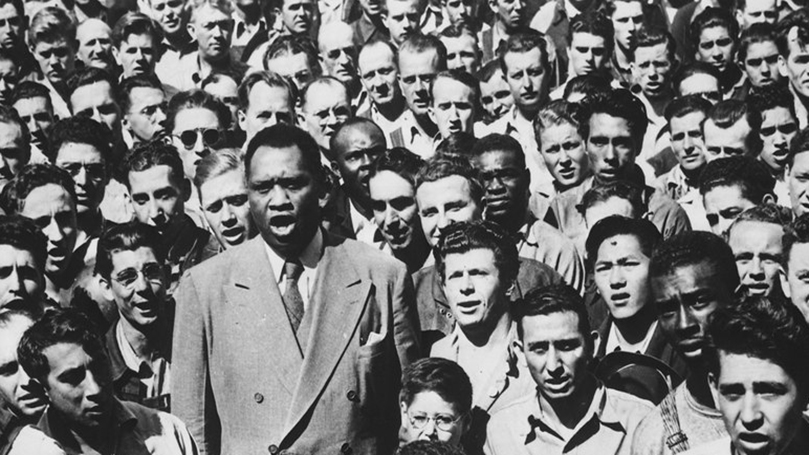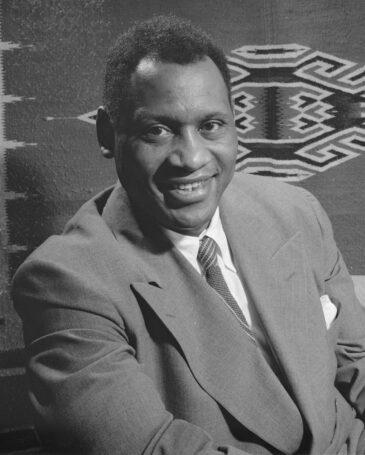
Few can excel at two high-profile careers. It’s almost unheard of to excel at four or five, so when someone can, you know they are gifted beyond measure. Paul Leroy Robeson was one such person.
His immense talent, coupled with his strong support for civil rights, labor, and peace, made him a powerful figure on the Left and a target of the Right.
Robeson was born on April 9, 1898, in New Jersey to Maria Louisa Bustills, a member of a prominent Quaker family, and Rev. William Drew Robeson, who had escaped from slavery while in his teens. After his mother died when he was six, his family was often uprooted and subjected to deep poverty.
Though Robeson was a star athlete, it was his grades that got him a scholarship into college. As a high school student, he drew the attention of the NAACP, which wrote a short article in the Crisis about his accomplishments. Robeson attended four universities and earned a law degree. Throughout his academic career, he sang and acted in musicals, was part of several clubs such as theater and debate, and still had time to play professional football for two NFL leagues.
He flourished in everything he put his hand and mind to, especially with his sweetheart wife/talent agent Eslanda (“Essie”) at his side. However, this was not without its share of prejudice and racism.
Robeson practiced law for a short while but left due to rampant racism in the field. Though he played football, it was touring while singing and acting that he loved.
Beginning in the 1930s, Robeson refused to be disrespected and insisted he set an example for how Black men should act and be treated. He wrote an essay called “I Want to Be African” and set out to learn his roots and to apply them to his and his people’s future.
He befriended British socialists and anti-capitalists. He visited the Soviet Union, where he felt “at home” and “for the first time like a full human being.”
 In 1935, he took a role in the film Sanders on the River, thinking it would be good for the world to see how actual Africans looked and behaved. Though it gained him worldwide fame, the stereotypical portrayal damaged his reputation. When a commissioner of British colonial Nigeria protested the film, Robeson became more conscious of the roles he took.
In 1935, he took a role in the film Sanders on the River, thinking it would be good for the world to see how actual Africans looked and behaved. Though it gained him worldwide fame, the stereotypical portrayal damaged his reputation. When a commissioner of British colonial Nigeria protested the film, Robeson became more conscious of the roles he took.
In 1928 Robeson performed the role of “Joe” in the British production of the musical Showboat and later in the 1936 film version. He became known for a signature song, “Ol Man River,” and sang it often at concerts. Over the years he omitted the racist words and changed the lyrics from “I’m tired of living’ / And scared of dying” to the militant “I must keep fightin’ / Until I’m dyin’.”
Exposure to the Spanish Civil War was a turning point for his anti-fascist views. He supported the communist and anarchist causes, assisted the Loyalist bando republicano, and aided war refugees. In London in 1937 he gave a famous anti-fascist speech where he said, “The artist must take sides. He must elect to fight for freedom or slavery.” Robeson went to Spain to sing to soldiers in support of the short-lived International Brigade. He met the Chinese progressive activist Liu Liangmo, who taught Robeson the patriotic song “Arise!,” which Robeson would perform live and record in studio.
Robeson often challenged segregationist policies. In 1940, he performed before a packed audience of 30,000 at the Hollywood Bowl. Yet only one hotel in Los Angeles would take his money, and with the caveat that he register under an assumed name. He did so, and then sat daily in the hotel’s lobby where he was easily recognized. Soon after, restrictions for Black guests lifted in Los Angeles hotels.
His political voice was unwelcome by many in the 1940s. The FBI labeled a documentary he narrated, South Africa Uncensored, as communist propaganda. He stopped acting in film due to casting limitations and the portrayal of Black people. He tried, and failed, to convince the baseball commissioner to allow Black men to play ball with white men.
After the lynching of four Georgian Black men by a white mob in 1946, Robeson and six others met with President Truman, imploring him to make lynching illegal. Truman ended the meeting abruptly when Robeson began reading his forceful statement. Robeson called for Americans to fight for civil rights and created the American Crusade Against Lynching, but the NAACP viewed this group as disruptive to their tactic of using the court system to press their case for equality.
He spoke out against imperialism and colonialism, resulting in the mainstream press demonizing him in 1949. Even the NAACP magazine that praised him when he was in high school refused to write anything about him. The House Un-American Activities Committee questioned the Black pro-baseball player Jackie Robinson about a speech Robeson made in France. He testified that Robeson’s claims were “silly.”
A major book about college football failed to list Robeson as a Rutgers player. A critique was written about him in Crisis and J. Edgar Hoover had it sent all over Africa. Robeson’s influence was being constricted, as the government feared—and caused fear of—his message.
In 1949 Robeson performed in Peekskill, New York; after the concert, an anti-communist mob rioted, beating concert-goers and vandalizing their cars. The FBI pressured concert organizers, including Black churches, to stop booking performances. The State Department revoked his passport in 1950, putting an end to his international concerts for eight years.
This didn’t mean he didn’t get love. Due to his passport situation, labor unions organized annual concerts where Robeson performed on the border between Washington State and British Columbia. In 1952 he was awarded the International Stalin Prize.
In 1956, Robeson was dragged before the House Un-American Activities Committee. He refused to answer any questions regarding his political affiliations and accused the HUAC of fascism. He said that America is what it is because enslaved people like his father built it. When asked whether he was a member of the Communist Party, he replied, “Do you mean a party of people who have sacrificed for my people, and for all Americans and workers, that they can live in dignity? Do you mean that party?”
All of his speeches, recordings, and films were banned from public distribution. However, he continued to sing, even over telephone lines to overseas audiences that paid to hear him.
In 1958, after the Supreme Court ruled that it was unconstitutional to deny a passport based on one’s political views, the State Department was forced to return Robeson’s passport. He immediately embarked on a world tour but returned to the United States in 1963 because of declining health. His wife died in 1965, and Paul Robeson died 11 years later.
His life was a series of firsts. He stuck to his convictions and always supported the working class. He used his platform and abilities to push forward a progressive, humanist vision where all are equal and free from discrimination.
There are numerous sources on Paul Robeson’s rich and varied life, including historian Gerald Horne’s biography Paul Robeson: The Artist as Revolutionary, Robeson’s autobiography, Here I Stand, and a recent article by Tony Pecinovsky, “Paul Robeson — The Revolutionary.” Watch Robeson singing “Joe Hill” to Scottish miners in 1949.
Images: Robeson singing for California shipyard workers, Wikipedia (public domain); Robeson in 1942, Gordon Parks, Wikipedia (public domain).


 Join Now
Join Now